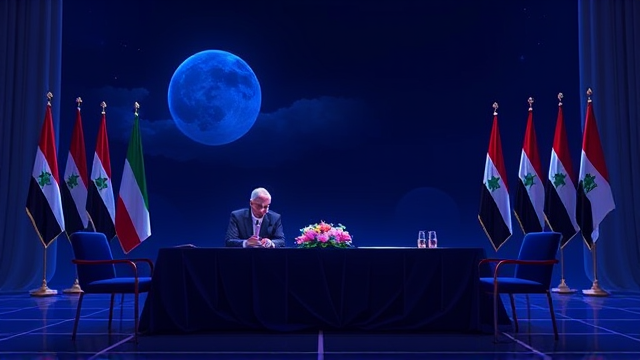US President Signs Gaza Ceasefire Deal in Egypt
In a move that will be scrutinized by historians for its geopolitical weight, the United States President, alongside a cadre of world leaders, has formally inked the first phase of a Gaza ceasefire agreement in the Egyptian resort city of Sharm el-Sheikh, a location long accustomed to serving as a neutral ground for high-stakes diplomatic theater. This initial framework, while a critical de-escalatory step, represents not an end but a fragile beginning, a tentative handshake in a conflict defined by generations of animosity and shattered precedents.The signing ceremony itself, with its polished tables and solemn handshakes, evokes the ghost of past accords—the Oslo I Accord of 1993 comes immediately to mind, another moment of profound hope that ultimately faltered on the rocky shores of implementation and mutual distrust. The core challenge for this new deal, as with any such endeavor in the Levant, lies not merely in the cessation of hostilities, which is a logistical and military undertaking, but in the political will required to address the underlying grievances that fuel the cyclical violence: the status of Jerusalem, the right of return for Palestinian refugees, and the very viability of a two-state solution, a concept that has seemed increasingly moribund in recent years.One can draw a parallel to the post-World War I settlements, where the Treaty of Versailles imposed a peace without addressing the fundamental humiliations and economic desolation that paved the way for future conflict; a ceasefire that does not actively and credibly work towards a just and sustainable political horizon is merely an intermission. Analysts from the International Crisis Group have already pointed to the immense hurdles in this 'Phase One,' which likely involves a complex hostage and prisoner exchange, the delivery of a massive scale of humanitarian aid into a decimated Gaza, and the delicate positioning of international monitors to police the truce lines.The role of regional powers—Egypt and Qatar as primary mediators, with Saudi Arabia and Jordan watching intently from the wings—cannot be overstated, signaling a potential realignment of Middle Eastern diplomacy away from pure antagonism and towards a more pragmatic, albeit tense, coordination of interests, particularly concerning the perceived threat of a wider regional conflagration. Conversely, the domestic political ramifications for the US President are equally profound; he must navigate a deeply fractured political landscape at home, where significant factions within his own party demand an end to unconditional support for one side, while the opposition party largely champions it, making this diplomatic foray a high-wire act with his own re-election prospects hanging in the balance.The shadow of previous American administrations looms large, from the Camp David Accords that successfully forged peace between Egypt and Israel to the more recent and ill-fated 'Deal of the Century,' which was largely dismissed by the Palestinian leadership. The success of this initiative will be measured not by the photo opportunities in Sharm el-Sheikh, but by what unfolds in the coming weeks and months: whether aid consistently reaches civilians, whether extremist elements on both sides can be restrained from provocations, and whether the diplomatic channels established for this truce can be repurposed for the far more arduous task of negotiating a lasting peace.As Winston Churchill once remarked, 'To build may have to be the slow and laborious task of years. To destroy can be the thoughtless act of a single day. ' The signing of this deal is the first, painstaking brick laid upon a foundation of ruins; whether the structure that follows will be a house of peace or merely another temporary shelter from the storm remains the paramount, unanswered question of our time.
Latest News
The picturesque Malaysian tourist town of Kundasang, nestled in the shadow of Mount Kinabalu on the island of Borneo, has been thrust into an unwelcome
12 minutes ago0 comments
In a decisive maneuver resonating with the strategic calculus of a geopolitical gambit, the Netherlands has seized operational control of a Chinese-owned
22 minutes ago0 comments
In a stark declaration of resilience that reverberated through the financial hubs of Asia, Hong Kong’s Chief Executive John Lee Ka-chiu has projected an
47 minutes ago0 comments
The initial exchange on Monday, where Israeli hostages gained freedom and Palestinian prisoners were released from Israeli detention, represents not a
1 hour ago0 comments
The political arena in South Korea is heating up with a strategic move that feels ripped straight from the campaign war room playbook, as the conservative
1 hour ago0 comments
As China methodically drafts its 15th five-year plan, a document that will set the nation's developmental trajectory from 2026 to 2030, the geopolitical
1 hour ago0 comments
In a calculated maneuver resonating with the strategic foresight of a geopolitical chess grandmaster, the Netherlands has executed a decisive state
2 hours ago0 comments
In a decisive maneuver that sent immediate shockwaves through the geopolitical and technological landscape, the Dutch government has seized operational control
3 hours ago0 comments
It’s quiet here...Start the conversation by leaving the first comment.
